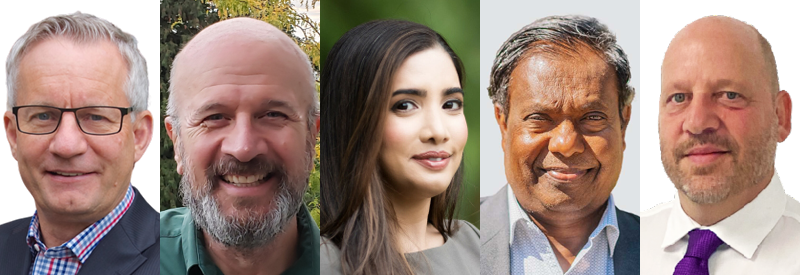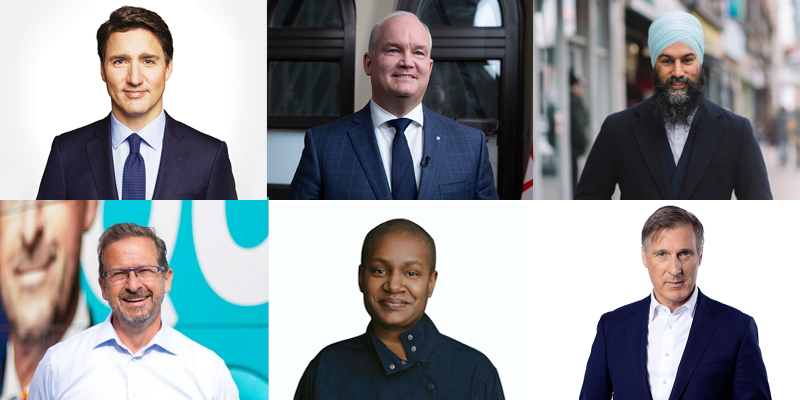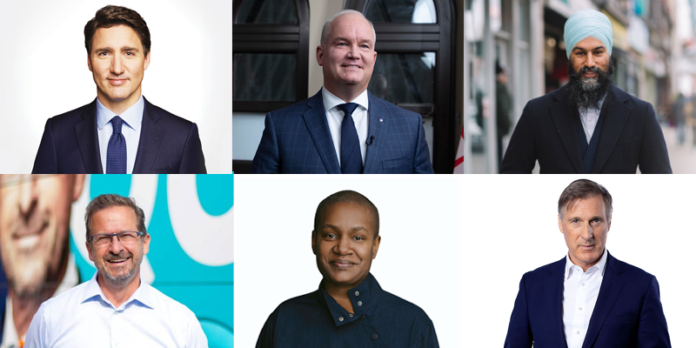By Darien Johnsen & Chandy Dancey
In a snap election call from Trudeau and the Liberals, Monday, September 20 will mark Canada’s forty fourth federal election. With the deadlines already having passed for advance polling and voting by mail, in person voting on election day remains the next best way to cast your vote. Elections can be difficult to navigate, and there are plenty of hot topics to consider during this election period — COVID-19, Indigenous reconciliation, and the climate crisis, among other pressing issues that threaten stable life on this planet. If you’re unsure of where to start, how to vote, or who to vote for, The Cascade offers you a guide to party platforms, local candidates, and voting in general.
What do you need to do to vote?
To be eligible to vote, you must:
- Be a Canadian citizen
- Be 18+ on election day
- Have proof of your identity and address
If you haven’t already, you must also register to vote. If you’re unsure of your voter registration, you can check online on the Election Canada website or register at your assigned polling place on election day. On election day, stop by your assigned polling station in your riding. (To find out where this is, check your voter information card or use Elections Canada’s online tool.)
To prove your identity and address, there’s a long list of accepted forms of ID. You either want to bring one piece of picture ID (driver’s license or government ID) or two forms of ID with your name and current address. If you don’t have any ID, look into having someone vouch for you.
How does the Canadian political system work?
According to the Parliament of Canada’s website, the “Parliament is the legislative (lawmaking) part of government, made up of the Monarch, the Senate, and the House of Commons.” The Senate is composed of individuals that are appointed by the Governor General (the official representative of the Monarch). The House of Commons is made up of elected individuals called Members of Parliament (MPs) — i.e., the person you will be voting for when you head to the polls!
Canada is divided into 338 electoral districts known as ridings. Your vote during the federal election helps determine which local represents your riding at the House of Commons as an MP. Following a general election, the leader of the political party with the most elected representatives will become the Prime Minister and their party will normally form the Government. The party with the second-most elected representatives usually becomes the official Opposition.
How has COVID-19 affected voting?
The same health and safety precautions practiced all over the province will be in place on election day — social distancing markers, hand sanitizer stations, masks, and plexiglass will all be present. You can also bring your own pen or pencil if you don’t wish to use those provided.
If you develop symptoms of COVID-19 or test positive after advance polling days or on election day, you’re encouraged to vote by mail. After the Sept. 14 deadline though, if you haven’t already applied to vote by mail, Elections Canada says you will not be able to vote. Voters will not be required to provide proof of vaccination to vote.
Abbotsford candidates
 Conservative
Conservative
Candidate: Ed Fast
Ed Fast has been working with the House of Commons since 2006. Serving under Stephen Harper as Minister of International Trade, Fast has an extensive history in the economic, legal, and financial sector. Fast also became Canada’s longest serving Trade Minister in 2015. During his 2019 run for MP, Fast collected more votes than his four opponents combined.
In an article from the Abbotsford News, Fast is quoted as saying the most pressing issues during this campaign were rising cost of living, the cost of housing, and the Liberal’s “unethical conduct.”
Green
Candidate: Stephen Fowler
This year, Fowler will be entering the election race for the third time. Fowler has been a teacher in Abbotsford for 25 years and strives to be a voice for students and the younger generation. His main concern is climate change and human survival. He has also stressed that other issues, such as Indigenous reconciliation, social justice, and ethical governance all tie into fighting climate change.
Liberal
Candidate: Dr. Navreen Gill
Dr. Gill was born and raised in Abbotsford and has spent time serving her community as a family physician on Abbotsford’s front lines. Of primary importance to her is developing a strong and inclusive post-pandemic recovery plan, ensuring that communities have the resources and support they need. Dr. Gill has also expressed concerns regarding resource protection.
NDP
Candidate: Dharmasena Yakandawela
Yakandawela is an immigration lawyer as well as the founder of an immigration law firm. Making life affordable — particularly housing — and supporting small businesses and families is of priority to him, as well as combatting racism, discrimination, and homophobia.
He is quoted in the Abbotsford News saying that he “believe[s] in a Canada where everyone should have the chance to succeed.”
PPC
Candidate: Kevin Sinclair
Described by the Abbotsford News as an environmental advocate, Sinclair hopes to further the conservative and “common-sense policies” of the People’s Party. He serves his community by volunteering at The Stream, a faith-based organization serving the at-risk population in Abbotsford and advocating for environmental issues such as the banning of toxic lead shotgun ammunition. Important to him is individual freedom, personal responsibility, fairness, and respect.
Chilliwack–Hope candidates
 Conservative
Conservative
Candidate: Mark Strahl
Born and raised in Chilliwack, Strahl is dedicated to serving his community. He is a member of several prominent community organizations. In 2011, he was elected to the House of Commons, serving under Stephen Harper, and was re-elected as MP for Chilliwack in 2015 and 2019 (the year in which he collected nearly 50 per cent of the vote) as well as serving three years under Andrew Scheer as Chief Opposition Whip.
Green
Candidate: Arthur Green
Green states that his main priority in this election is climate action and addressing issues of man-made climate change, including its impacts on our health, economy, and ecosystems. He’s run for past federal and provincial elections, citing in the Hope Standard that he’s driven by “innovation and technology platforms in regards to local economic development” and is a keen follower of the Intergovernmental Panel on Climate Change.
Liberal
Candidate: Kelly Velonis
Velonis decided to run in the federal election mostly due to a desire to assist in the recovery of her community. In her professional life, Velonis is the executive director of Chilliwack & District Seniors’ Resources Society. She is an advocate and believes in encouraging a healthy, strong, and competitive community.
Chilliwack-Hope Riding vice-chair Kevin Standeven is quoted in the Chilliwack Progress stating that Velonis’ “passion for our community and history of taking action to improve the lives of others are what [the Liberals are] all about.”
NDP
Candidate: DJ Pohl
Pohl is a UFV alumna, holding a Bachelor of Arts degree in Criminal Justice. She currently works for the B.C. Prosecution Services. Pohl stresses the importance of harm reduction principles in addressing pressing issues in the community. Unions, local ecosystem protection, and support for working class families are of key importance to Pohl; and she strives to bridge gaps in resources.
PPC
Candidate: Rob Bogunovic
Born in Chilliwack, Bogunovic is a UFV alumni that’s gone on to pursue a master’s degree in education, teaching at Chilliwack Secondary (CSS) through most of his career. Since 2000, Bugonovic has been heavily involved in his community, sponsoring student clubs at CSS, serving as ambassador for the Chilliwack Cyrus Centre, and being active within his church, both as a volunteer and a deacon. He’s passionate about advocating for freedom of speech, individual rights, and religious freedom.
Federal Party candidates:

Liberal
Candidate: Justin Trudeau
Vaccines: The Liberals have announced they would make COVID-19 vaccinations mandatory for federal public service workers, federally regulated transportation workers, and any commercial air, interprovincial train, and cruise ship passengers. Trudeau suggested the possibility of consequences for unvaccinated individuals who refuse the vaccine for reasons other than medical.
Reconciliation/ Indigenous relations: An extensive plan has been announced by the Liberal party that aims to support First Nations communities. It includes plans to invest in family services, mental health and wellness resources to address the legacy of residential schools, cultural preservation strategies, economic development, as well as plans to implement what they are calling An Act respecting the United Nations Declaration on the Rights of Indigenous Peoples (UNDRIP) in addition to a co-developed Action Plan to ensure the objectives in the Declaration are achieved.
Climate Goals: Ambitiously, the Liberals have a plan to achieve net zero emissions by 2050 by working with all Canadians and the Net Zero Advisory Committee to advance climate action. They plan to achieve this by implementing Border Carbon Adjustments on imports, what they call “smart carbon pricing” that will put money back into the pockets of Canadians.
Also on this climate platform is a promise to develop a plan to phase out public financing of the fossil fuel industry, ban thermal coal exports from and through Canada, hold oil and gas companies accountable for reducing their methane emissions by 75 per cent below 2012 levels, as well as develop the National Research Council and global leader in methane detection and elimination.
Housing: The Liberals plan to continue to follow the Canadian National Housing Strategy — a 10 year plan that includes $72 billion to address chronic homelessness and affordable housing.
Their platform lists a number of things they have implemented in the past including introducing legislation to recognize the rights of Canadians to access adequate housing, announcing a national tax on vacant properties, committing $1.7 billion to First Nations, Inuit, and Metis communities for distinctions-based housing strategies, and tripling the federal government’s investment in homelessness prevention and reduction.
Economy: The Liberal’s plan to rebuild Canada’s economy by asking the largest financial institutions to pay more taxes to ensure that Canadians can become homeowners and recover after the economic shock of COVID-19.
Their platform also includes getting 1.4 million families into new homes, cracking down on predatory practices, and helping Canadians get faster down payments.
Conservative
Candidate: Erin O’Toole
Vaccines: Conservative leader Erin O’Toole opposes mandatory vaccination passports and calls it a political tool being used to divide Canadians. The Conservatives have stated that they are working hard to make vaccines accessible for everyone. O’Toole stated:
“Canadians want a reasonable and balanced approach that protects their right to make personal health decisions and the need to keep everyone safe.”
Conservatives are pushing for a daily rapid test for unvaccinated public servants and a negative COVID-19 test for travellers.
Reconciliation/ Indigenous relations: O’Toole is quoted in an article from Global News as saying: “We’re going to make progress on the TRC calls to action because they’re very important and they should be beyond politics.”
O’Toole has stated that he would support the building of the Northern Gateway pipeline to support revenue going to Indigneous communities along the proposed route. Six specific action items have been committed by the Conservatives that aim to deal with the deaths of children in residential schools. These action items include funding investigations at all form residential school sites where unmarked graves may exist.
Climate Goals: The Conservatives have proposed a carbon pricing system that is lower than their political counterparts. This would see carbon taxes being put into “personal low-carbon savings accounts” intended to be used for green purchases. Other items on their agenda include a mandate requiring all new cars to be zero-emissions by 2035, a carbon-capture program, investments into natural climate solutions, lower industrial emissions by shifting reliance onto natural gas, and carbon border tariffs.
Housing: The Conservatives state that they would ban foreign investors who don’t plan to live in Canada from buying homes; also proposed are plans to build one million homes, and plans to incentivize home buyers.
Economy: In the Conservative tradition, reducing spending is a priority. Their plan includes winding down COVID-19 economic recovery plans, managing stimulus measures to ensure the avoidance of a deficit, plans to boost gross domestic product (GDP) over five years, and drive employment and investment — including a return to investments in Canada’s energy sector.
NDP
Candidate: Jagmeet Singh
Vaccines: Like the Liberals, the NDP would mandate vaccines for federal workers as well implement a travel-focused vaccine passport. Singh also suggests the possibility of employers implementing consequences for employees who refuse to be vaccinated.
Reconciliation/ Indigenous relations: The NDP have an extensive plan to advance reconciliation. Their plan prioritizes fully implementing the United Nations Declaration on the Rights of Indigenous Peoples and the Truth and Reconciliation Commission’s 94 Calls To Action. Investing in children, education, housing, public services, and clean water, and nurturing healthy communities makes up just some of the NDP’s reconciliation plan.
Climate Goals: Net-zero legislation, carbon pricing, corporate climate accountability, public funding for renewable energy, and implementing legislation to ban future oil, gas, and pipeline investments are priorities for the NDP.
Focusing on Canadian production of green energies, the NDP also states that supporting businesses who are transitioning to greener technologies is in their climate plan.
Housing: Home ownership is the focus of the NDP’s housing plan. Helping people stay in their communities and near their work is important, as well as ensuring that affordable rental units are available. They propose mobilizing federal resources and lands to fund what they call “fast-start funds” in order to streamline housing application processes.Other economic housing reliefs the NDP have proposed include doubling the Home Buyer’s Tax Credit to $1,500, easing access to mortgages, and providing immediate relief for families struggling to afford rent.
Economy: The NDP prioritize better working conditions and good jobs that treat people fairly. Proposals to develop more rights for workers include more paid sick days, negotiating power, effective employment insurance, a livable income, and building Canadian industries are some of the proposals outlined in their economic recovery plan.
Supporting small business through wage and rent subsidies, and growing fair trade practices by improving transparency and engaging with Candians on the costs and benefits that are to be expected with potential trade deals are also outlined in the NDP’s economic plan.
Bloc Québécois
Candidate: Yves-François Blanchet
Vaccines: The Bloc proposes a strategy to increase the national production of COVID-19 vaccines to reduce foreign dependency for supply. Moderna has agreed to build a vaccine manufacturing facility in Canada, and Blanchet said that he would advocate for this plant to be built in Quebec.
Blanchet has spoken in favour of a vaccine passport for international travel.
Reconciliation/Indigenous relations: The Indian Act, which has been in place for nearly 150 years, will be abolished. Instead, the Bloc wants to work with Indigenous communities federally to fully implement UNDRIP. The party also believes in Indigenous people’s right to self-govern and would put pressure on the federal government to carry out the actions of the Truth and Reconciliation Commission.
Climate Goals: Their platform acknowledges that climate change has become a climate crisis, that Canada has a responsibility to become carbon neutral as the fourth largest producer of petrol, and that current measures in place are not enough. Blanchet proposes to make the federal government’s 2030 emissions reduction goal in the Canadian Net-Zero Emissions Accountability Act legally binding to create accountability for the goal being met.
The Bloc also supports Canada’s transition to green energy, and proposes investments in ecological innovation, technological change, and research and development — they hope to achieve these goals in a way that benefits and creates wealth throughout Quebec. In this same vein of protecting Quebec’s interests, they want the federal government to redirect funds toward Hydro-Quebec’s green initiatives and to stop funding competitors of Hydro-Quebec.
Additionally, the party is against the Trans Mountain pipeline and opposes any plans to extract oil from tar sands.
Housing: Blanchet proposes that the federal government work towards investing up to 1 per cent of its total annual revenue in affordable housing, and to commit to predictable financial aid for housing rather than one-off agreements. His party is also in favor of a tax on real estate speculation to counter the rise of housing costs, and that surplus federally-owned property be used to create affordable housing.
Economy: The Bloc is concerned with upholding Quebec’s economic interests such as developing their forestry, aluminum, agricultural, and aerospatial industries as well as building infrastructure within the province. The party wants to preserve and fund Quebec’s local business sectors and protect their industries from foreign control.
Green
Candidate: Annamie Paul
Vaccines: Leader Annamie Paul has not taken a hard stance on mandatory vaccine passes but has brought up concerns about how the federal government would accommodate people who are unable to be vaccinated. Her statement reads:
“However, we know that there are people who are unable to get vaccinated for legitimate reasons, whether those be medical conditions, religious, or cultural convictions, or that live in rural communities with limited access to either vaccination clinics or information that addresses their concerns. What accommodations will be made for them?”
Reconciliation/ Indigenous relations: The Green party acknowledges the systemic oppression and intergenerational trauma that Indigenous people have faced. Their platform supports the implementation of UNDRIP, the recommendations of the Truth and Reconciliation Commission, and the Final Report of the National Inquiry into Missing and Murdered Ingenous Women and Girls. It’s also dedicated to upholding financial responsibilities to Indigenous communities, honouring treaties, and establishing processes for self-governing Indigenous nations to transition out from the Indian Act.
Climate Goals: The Green party is committed to achieving net zero emissions as soon as possible — which they outline as a reduction of 60 per cent from 2005 levels by 2030. They also detail an end to all extraction of fossil fuels, meaning cancellation of all new pipeline projects, banning of hydraulic fracturing, and phasing out existing oil and gas operations. Their support of green initiatives extends to investing in green transportation, infrastructure, and innovation as well as fulfilling existing commitments to international climate change efforts.
Paul also supports proceeding with the banning of non-essential, single-use plastics before the end of 2021 and to champion a legally binding global plastics agreement.
Housing: The Green’s platform recognizes Canada’s housing and homelessness crisis. The party proposes an “empty home” tax for foreign and corporate-owned properties left vacant, and a reinvestment in “deeply affordable” housing through the building of housing units and the dedication of one per cent of GDP to housing and municipal infrastructure.
Economy: Many of the policies detailed by the Green party are to incentivize green industries and jobs and to disincentivize products and industries which are environmentally harmful by introducing or raising taxes. For example, accelerating the increase of carbon taxes by $25 per tonne each year from 2022-2030, and replacing every high paying fossil fuel sector job with a high paying green sector job through wage insurance and retraining programs.
Their platform also proposes a 1 per cent tax on net family wealth above $20 million, would institute a Guaranteed Liveable Income, and is in favour of decriminalizing illicit drugs for personal use.
PPC
Candidate: Maxime Bernier
Vaccines: The PPC wants to repeal vaccine mandates and vaccine passports. Leader Maxime Bernier has publicly declared he will not be receiving a COVID-19 vaccine.
Reconciliation/Indigenous relations: Under a PPC government, options would be sought to replace the Indian Act with a new legal framework that promotes self-reliance and equal rights. The platform is also in favour of respecting treaties, reviewing federal spending in regards to how programs are benefitting Indigenous people, and partnering and consulting with Indigenous communities on infrastructure and natural resource projects.
Climate Goals: Bernier’s platform believes there are “uncertainties over the scientific basis of global warming” and opts to cut costs designed to fight it. The PPC proposes to withdraw Canada from the Paris Accord, abandon greenhouse gas emission reduction targets, abolish the carbon tax, and allow provincial governments to independently adopt programs to reduce emissions if they wish.
Housing: The PPC sees housing as a provincial/local responsibility, and believes that federal intervention will yield little results. Instead, their platform focuses on reducing contributions to the housing crisis by reducing immigration quotas to reduce housing demand, ceasing to fund social housing which competes with private developers, and working with provinces to curb speculation by foreign non-resident buyers in the Canadian market.
Economy: The platform of the PPC favours freeing more funds for Canadians to save or invest as well as encouraging productive economic growth by lessening government intervention. Instead, Bernier’s party would abolish personal capital gains tax, reduce corporate income tax by 5 per cent to free funds for businesses, and eliminate all corporate subsidies and “inefficient government interventions.” Some specific interventions mentioned are tax credits, bailouts for businesses, and regional development grants.
Images: official party websites



